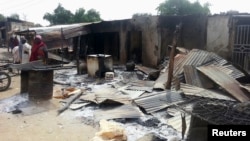ABUJA —
Scores of people have been killed and entire villages burned to the ground in recent days in ongoing battles between herders and farmers in rural northern and central Nigeria. Northern leaders say weapons are being smuggled into Nigeria from other African conflicts and security forces are increasingly outgunned and outmanned.
Cow herders in northern Nigeria said an AK-47 can cost about $2,000, but they sometimes had no choice but to sell some animals to protect the rest from thieves.
Attacks and counter attacks between farmers and cow herders in Nigeria have been going on for decades, but in recent years, insurgency and political crises have intensified the fighting.
The national secretary of the Miyetti Allah Cattle Association of Nigeria, Sale Bayari, said regional insecurity had in some cases driven down the price of weapons to as little as a few sacks of maize.
“Because of the crisis in Libya, the crisis in Niger, the crisis in Mali we believe that a lot of arms, we know, got their way into Nigeria,” said Bayari.
More weapons, he said, mean more casualties in battles. More casualties mean more revenge attacks.
The chairman of the Northern Governor’s Forum, Niger State Governor Aliyu Babangida, said hundreds of people have been killed in clashes during the past week.
At a conference on Monday he asked the federal government to send more troops to guard international borders where weapons are smuggled into Nigeria.
“The forum calls on the federal government to secure the country’s porous borders by restricting transport and movement, especially in the northeastern states of Adamawa, Borno and Yobe,” said the governor.
The three states he mentions have been under emergency rule for nine months as security forces battle Islamist militants known as Boko Haram.
The group has killed thousands of people in the past four and a half years. This insurgency is a separate issue from clashes between cow herders and farmers, but the crises feed off each other.
In general, the clashes are between Muslim cow herders and Christian farmers, and the groups are also divided from each other ethnically and politically.
Imam Sani Isa, from the Peace Revival and Reconciliation Foundation of Nigeria, said Boko Haram, which says it wants to enforce its own harsh version of Islamic law, fueled hostilities between Christians and Muslims by claiming its attacks were motivated by religion.
"The insurgents of Boko Haram increase the volume of the conflict in the north between the Christians and the Muslims," said Isa.
This week, Governor Kashim Shettima of Borno state, which is the heart of the insurgency, angered federal officials by saying insurgents have more weapons and more motivation than Nigerian security forces.
At a press conference in the Nigerian capital Tuesday, a spokesperson for President Goodluck Jonathan said violence has increased recently because security forces have chased Boko Haram fighters from their hideouts and that nearly a quarter of Nigeria’s national budget in 2014 is allotted for security.
(Ibrahima Yakubu contributed to this report from Kaduna.)
Cow herders in northern Nigeria said an AK-47 can cost about $2,000, but they sometimes had no choice but to sell some animals to protect the rest from thieves.
Attacks and counter attacks between farmers and cow herders in Nigeria have been going on for decades, but in recent years, insurgency and political crises have intensified the fighting.
The national secretary of the Miyetti Allah Cattle Association of Nigeria, Sale Bayari, said regional insecurity had in some cases driven down the price of weapons to as little as a few sacks of maize.
“Because of the crisis in Libya, the crisis in Niger, the crisis in Mali we believe that a lot of arms, we know, got their way into Nigeria,” said Bayari.
More weapons, he said, mean more casualties in battles. More casualties mean more revenge attacks.
The chairman of the Northern Governor’s Forum, Niger State Governor Aliyu Babangida, said hundreds of people have been killed in clashes during the past week.
At a conference on Monday he asked the federal government to send more troops to guard international borders where weapons are smuggled into Nigeria.
“The forum calls on the federal government to secure the country’s porous borders by restricting transport and movement, especially in the northeastern states of Adamawa, Borno and Yobe,” said the governor.
The three states he mentions have been under emergency rule for nine months as security forces battle Islamist militants known as Boko Haram.
The group has killed thousands of people in the past four and a half years. This insurgency is a separate issue from clashes between cow herders and farmers, but the crises feed off each other.
In general, the clashes are between Muslim cow herders and Christian farmers, and the groups are also divided from each other ethnically and politically.
Imam Sani Isa, from the Peace Revival and Reconciliation Foundation of Nigeria, said Boko Haram, which says it wants to enforce its own harsh version of Islamic law, fueled hostilities between Christians and Muslims by claiming its attacks were motivated by religion.
"The insurgents of Boko Haram increase the volume of the conflict in the north between the Christians and the Muslims," said Isa.
This week, Governor Kashim Shettima of Borno state, which is the heart of the insurgency, angered federal officials by saying insurgents have more weapons and more motivation than Nigerian security forces.
At a press conference in the Nigerian capital Tuesday, a spokesperson for President Goodluck Jonathan said violence has increased recently because security forces have chased Boko Haram fighters from their hideouts and that nearly a quarter of Nigeria’s national budget in 2014 is allotted for security.
(Ibrahima Yakubu contributed to this report from Kaduna.)





